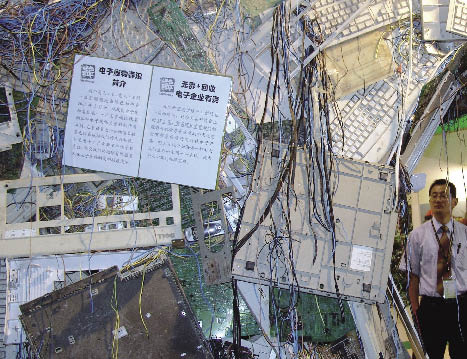|
The Way to Industrialization
But recycling enterprises are facing difficulties: they are calling for more order in the market. Currently, five million televisions, four million refrigerators, six million washing machines and ten million mobile phones are scrapped each year in China. But the reality is professional recycling enterprises find themselves in short supply. "Most of the scrapped appliances are moving to small mills and rural markets right now," Chen Xuezhang explains. The majority are dismantled in unqualified small plants.
Another professional recycling enterprise, Liaoning Muchang Industrial Solid Waste Disposal Co., Ltd. is facing the same problem. Though the company's president Bai Bing is confident about the future of the recycling industry, he cannot help worrying about the present predicament: "We have no price advantage over small mills since our initial investment is quite large. To keep the profit margin, we can only offer a purchasing price that is relatively low."
The system of scrapped appliance purchasing, selling, reusing and disposing is based on market logic, a mechanism driven by profit. Bai Bing says an old computer can fetch RMB 200 on the second-hand market, but can be sold at only RMB 50 to recycling companies. That is the reason why large numbers of scrapped electronics go to private recyclers.
Zhao Weimin, spokesman of Guangdong Galanz Group Co., Ltd., concludes the current recycling situation in China lacks the systematic regulation called for by its scale and volume.
The Measures for Trade-in of Household Electric Appliances and the earlier Regulations on Recycling of Electronic Waste are renewing the confidence of recycling enterprises. Chen Xuezhang said once Wanrong becomes a government designated recycler through the regular bidding process, the company would receive a transport subsidy from the government, thereby reducing its disposal costs.
Surveys show that 30 percent of all new household appliances sold are to replace old ones. If the new statutes are able to move the old appliances towards formal recyclers, companies like Wanrong will have sufficient bulk input to keep the plant busy.
Xu Dongsheng feels that the "trade-in" policy may pave the way for the industrialization of recycling. He believes this is the best way to save energy and protect our environment. At the same time, it is an approriate response to new EU environmental protection regulations.
In developed countries like Japan and Germany, manufacturers must take the responsibility for recycling. Companies jointly set up a foundation to sponsor a supervision bureau. All the recycling and disposal work must be done by qualified and capable companies.
 |
|
A notice in the window of a home electronics retailer explains the new recycling rules for electronic waste. China Foto Press |
Sunrise Industry
In 2003, two national appliance recycling centers were established in Shandong and Zhejiang provinces. After that, the National Development and Reform Commission (NDRC) decided to set up two more recycling centers in Beijing and Tianjin.
However, these projects are suffering financial losses. The NDRC's Department of Resource Conservation and Environmental Protection points the finger at competition between private recyclers, inferior recycling equipment and technology, the lack of related policies and regulations, and finally, heavy taxes on recycling enterprises.
The new policy is expected to arouse enthusiasm in these enterprises. At the same time, home appliance manufacturers have responded favorably to the measure. According to Li Dongsheng, chairman of TCL Corporation, the company intends to build two recycling economy parks in Guangdong and Tianjin, aiming to stimulate the recycling industry. TCL Corporation has invested more than RMB 200 million on its recycling section. Though research on advanced technology needs "big bucks," Li Dongsheng believes the initial investment indicates good days ahead.
At present, China is fueling the launches of more recycling projects. The first venous industry park in China – Qingdao New World Eco-Industrial Park – will have a business scope covering not just scrapped home appliances disposal, but also the recycling of industry solid waste within Shandong Province.
"Recycling enterprises are looking forward to hearing more details on the new regulations. It is believed the recycling of electric appliances is a 'sunrise industry' since the government attaches more and more significance to environmental protection," concludes Chen Xuezhang. | 